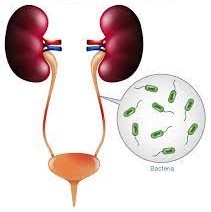The urinary and anal regions are highly sensitive areas that require proper care. Women have a lifetime risk of over 50% of developing a urinary tract infection (UTI), which is significantly higher than men. A UTI occurs when microbes infect any part of the urinary system, including the kidneys, ureters, bladder, and urethra. Research suggests that kidney infections tend to be the most severe.
Types of UTIs:
- Urethritis - Infection of the urethra
- Vaginitis - Infection of the vagina
- Cystitis - Infection of the bladder
- Pyelonephritis - Infection of the kidneys
Bacteria, often from the skin or rectum, can enter the urethra and spread, leading to infection. UTIs are common and can usually be self-diagnosed.
Symptoms of UTIs:
Common signs of a urinary tract infection include:
Frequent or intense urge to urinate.
Passing small amounts of urine frequently.
Burning sensation during urination.
Pain during urination or sexual intercourse.
The feeling of incomplete bladder emptying.
Foul-smelling, cloudy, or dark-coloured urine.
Pain in the bladder, groin, pelvis, or lower abdomen.
Fever, fatigue, and chills.
Blood in the urine.
Vaginal irritation or cramping.
Pressure or pain in the lower back.
Each type of UTI presents distinct symptoms based on the affected part of the urinary tract. Therefore, seeking medical advice is essential for proper diagnosis and treatment. Risk factors for UTIs include menopause, certain birth control methods, and being female. Escherichia coli (E. coli) is responsible for approximately 90% of UTI cases.
Risk Factors for UTIs:
Dehydration.
Use of certain birth control methods.
Sexual activity, especially with multiple partners.
Poor personal hygiene.
Pregnancy.
Kidney stones.
Diabetes.
Use of a urinary catheter.
Bowel incontinence.
Urinary blockages.
Treatment and Prevention:
Upper urinary tract infections generally take longer to resolve, but studies suggest that 20-50% of uncomplicated UTIs can clear on their own. However, antibiotics remain the most effective treatment.
Preventive Measures:
Stay hydrated by drinking plenty of water.
Do not hold in urine for extended periods.
Wipe from front to back after using the restroom.
Urinate before and after sexual intercourse.
Avoid using scented feminine hygiene products.
Be cautious with birth control choices.
Include probiotics in your diet.
Wear loose, breathable underwear.
Empty your bladder every 2-3 hours.
Perimenopausal and postmenopausal women may benefit from estrogen therapy, which helps restore the balance of vaginal bacteria. UTIs are the second most common type of infection in the human body. Due to their shorter urethra, women are more susceptible to bacterial entry into the bladder. In men, UTIs are often linked to an enlarged prostate, which can obstruct urine flow and create an environment for bacterial growth. Diagnosis typically involves a urine test. Adopting healthy habits can significantly reduce the risk of developing a UTI.
Managing and Reducing UTI Risk:
Urinate after sex - Helps flush out bacteria.
Drink unsweetened cranberry juice - It prevents bacteria from adhering to the urinary tract.
Increase Vitamin C intake - Makes urine acidic, helping to eliminate bacteria.
Consume probiotics - Found in yogurt, kefir, kimchi, etc.
Avoid spermicides - Can disrupt the vaginal flora.
Stay hydrated - Water helps flush out bacteria.
Lifestyle Changes to Prevent Recurring UTIs:
Making certain lifestyle modifications can further help prevent UTIs-
Eat more fruits and vegetables.
Limit coffee, alcohol, and spicy foods.
Reduce sugar intake.
Use a high-quality lubricant during intercourse.
Avoid allergen-containing feminine hygiene products.
Schedule regular visits with your physician.
Following prescribed medication instructions is crucial to prevent recurring infections. Consulting a doctor for proper diagnosis, treatment, and preventive care can significantly reduce UTI risks.
|

